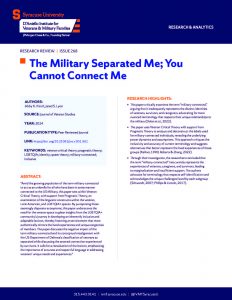Abstract:
“Amid the growing population of the term military-connected to act as an umbrella for all who have been in some manner connected to the US Military, this paper sets within Veteran Critical Theory, with support from Pragmatic Theory, an examination of the linguistic constructs within the veteran, Latin American, and LGBTQIA+ spaces. By juxtaposing these seemingly disparate ecosystems, this paper underscores the need for the veteran space to glean insights from the LGBTQIA+ community’s journey in developing an inherently inclusive and adaptable lexicon, thereby fostering an environment that more authentically mirrors the lived experiences and unique exigencies of members. The paper discusses the negative impact of the term military-connected and its conceptual misalignment with the US Department of Defense’s classification of veterans as separated while discussing the severed connection experienced by survivors. It calls for a reevaluation of the lexicon, emphasizing the importance of accurate and respectful language in addressing veterans’ unique needs and experiences.”
Research Highlights:
• This paper critically examines the term “military-connected,” arguing that it inadequately represents the distinct identities of veterans, survivors, and caregivers, advocating for more nuanced terminology that respects their unique relationships to the military (Dolan et al., 2022).
• The paper uses Veteran Critical Theory with support from Pragmatic Theory to analyze and deconstruct the labels used for military-connected individuals, revealing the underlying power dynamics and assumptions. This approach critiques the inclusivity and accuracy of current terminology and suggests alternatives that better represent the lived experiences of these groups (Kellner, 1990; Roberts & Zheng, 2022).
• Through their investigation, the researchers concluded that the term “military-connected” inaccurately represents the experiences of veterans, caregivers, and survivors, leading to marginalization and insufficient support. The authors advocate for terminology that respects self-identification and acknowledges the unique challenges faced by each subgroup (Schwandt, 2007; Phillips & Lincoln, 2017).

